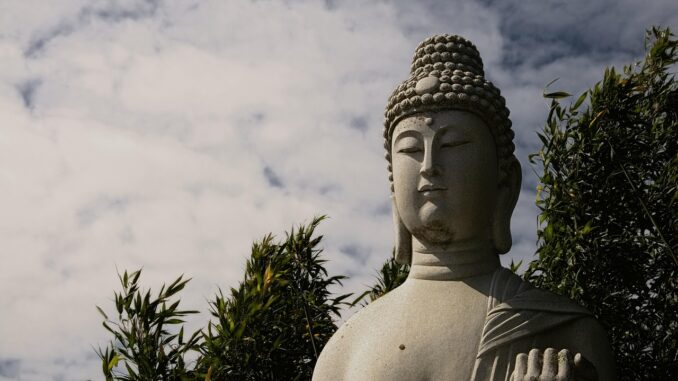
The original Päli term for Buddhism is Dhamma, the teachings of the Buddha. We call those who practise in accordance with the teachings “Buddhists”. A Buddhist should be non-aggressive, should possess good morals with pure thinking and pure living, and should abstain from all evil deeds. He or she should have compassion for himself or herself and others. The final goal of a Buddhist is to attain enlightenment. Superstitious beliefs, ideas, practices and blind faith are not the right way for the Buddhist. The Buddha’s teachings are all based on the premise of Ehipassiko “come and see”.
An attitude of patience, compassion and forgiveness is part of a Buddhist’s practice. The Buddha never encouraged his followers to harbour hateful thoughts or an attitude of discrimination and racism, because this attitude might lead people to be more hateful. Hateful or harmful thoughts can destroy both oneself as well as others and even the whole world. So a Buddhist should be wise to make human society happy, peaceful and united. Also, a Buddhist should understand that if he lets hateful thoughts be acted upon, he will become the heir of those deeds and
this is not the kind of deed to bring him to fuil enlightenment. Indeed, when he attempts to act wrongly, he is like a man who wants to throw dust at another against the wind.
When a fool hates a man that has no hate, Is purified and free from every blemish, Such evil he will find, comes back on him, As does fine dust thrown up against the wind
Visuddhi Magga
WHAT IS BUDDHASĀSANA?
The Pali word, Buddhasāsana literally means the doctrine of Buddha, or the teachings of Buddha. It is also known as the Dispensation of the Buddha. Those who have been practising the Dhamma in accordance with the teachings of Buddha are considered to be living within the Buddhasāsana. For them, the Buddhasāsana is still prosperous within themselves; the Buddhasasana still exists in these individuals. If Buddhists firmly practise moral conduct and meditation in accordance with the Dhamma, then the attitude of racism, discrimination and superstition will no longer exist among the Buddhist community. The Buddhasasana will enable people who firmly practise the teachings of Buddha to possess humane attitudes. In addition, there is no doubt that if we practise the Dhamma, the Dhamma will equally give happiness and peace, to everyone.
Oh Pahärada (the asura king) just as the great rivers: Ganga, Yamuna, Acıravati. Sarabhū and Mahi, entering the mighty ocean, lose their former names and identities and are termed simply ocean; so also these four castes: Khattiya (king or a warrior caste). Brahmná (brahamans), Vessa (merchants) and Sudda (a member of low caste), going forth from the world into the orders of sanghas,lose their former names and lineages are termed simply Bhikkhus, monks. This is fourth wondrous marvel in Buddhasasana, the dispensation of the Buddha. which the monks delight to see and see.
-Anguttara Nikāya
When a Buddhist starts learning the teachings and understands the virtues of the Buddha, Dhamma and Sangha, he or she will take three Refuges as follows:
Namo tassa bhagavato arahato sammāsambuddhassa.
Homage to Him, the Exalted, the Worthy, the Fully Enlightened One!
Buddham saranam gacchāmi.
Dhammam saranam gacchāmi.
Sangham saranam gacchāmi.
I go to the Buddha as my refuge.
I go to the Dhamma as my refuge.
I go to the Sangha as my refuge.
Leave a Reply